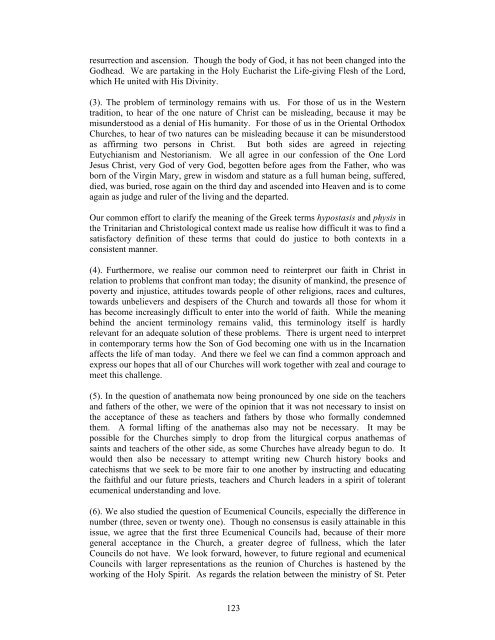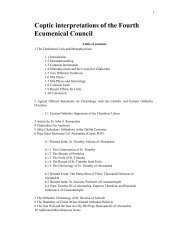Coptic Church & Ecumenical Movement - Saint Mina Coptic ...
Coptic Church & Ecumenical Movement - Saint Mina Coptic ...
Coptic Church & Ecumenical Movement - Saint Mina Coptic ...
Create successful ePaper yourself
Turn your PDF publications into a flip-book with our unique Google optimized e-Paper software.
esurrection and ascension. Though the body of God, it has not been changed into the<br />
Godhead. We are partaking in the Holy Eucharist the Life-giving Flesh of the Lord,<br />
which He united with His Divinity.<br />
(3). The problem of terminology remains with us. For those of us in the Western<br />
tradition, to hear of the one nature of Christ can be misleading, because it may be<br />
misunderstood as a denial of His humanity. For those of us in the Oriental Orthodox<br />
<strong>Church</strong>es, to hear of two natures can be misleading because it can be misunderstood<br />
as affirming two persons in Christ. But both sides are agreed in rejecting<br />
Eutychianism and Nestorianism. We all agree in our confession of the One Lord<br />
Jesus Christ, very God of very God, begotten before ages from the Father, who was<br />
born of the Virgin Mary, grew in wisdom and stature as a full human being, suffered,<br />
died, was buried, rose again on the third day and ascended into Heaven and is to come<br />
again as judge and ruler of the living and the departed.<br />
Our common effort to clarify the meaning of the Greek terms hypostasis and physis in<br />
the Trinitarian and Christological context made us realise how difficult it was to find a<br />
satisfactory definition of these terms that could do justice to both contexts in a<br />
consistent manner.<br />
(4). Furthermore, we realise our common need to reinterpret our faith in Christ in<br />
relation to problems that confront man today; the disunity of mankind, the presence of<br />
poverty and injustice, attitudes towards people of other religions, races and cultures,<br />
towards unbelievers and despisers of the <strong>Church</strong> and towards all those for whom it<br />
has become increasingly difficult to enter into the world of faith. While the meaning<br />
behind the ancient terminology remains valid, this terminology itself is hardly<br />
relevant for an adequate solution of these problems. There is urgent need to interpret<br />
in contemporary terms how the Son of God becoming one with us in the Incarnation<br />
affects the life of man today. And there we feel we can find a common approach and<br />
express our hopes that all of our <strong>Church</strong>es will work together with zeal and courage to<br />
meet this challenge.<br />
(5). In the question of anathemata now being pronounced by one side on the teachers<br />
and fathers of the other, we were of the opinion that it was not necessary to insist on<br />
the acceptance of these as teachers and fathers by those who formally condemned<br />
them. A formal lifting of the anathemas also may not be necessary. It may be<br />
possible for the <strong>Church</strong>es simply to drop from the liturgical corpus anathemas of<br />
saints and teachers of the other side, as some <strong>Church</strong>es have already begun to do. It<br />
would then also be necessary to attempt writing new <strong>Church</strong> history books and<br />
catechisms that we seek to be more fair to one another by instructing and educating<br />
the faithful and our future priests, teachers and <strong>Church</strong> leaders in a spirit of tolerant<br />
ecumenical understanding and love.<br />
(6). We also studied the question of <strong>Ecumenical</strong> Councils, especially the difference in<br />
number (three, seven or twenty one). Though no consensus is easily attainable in this<br />
issue, we agree that the first three <strong>Ecumenical</strong> Councils had, because of their more<br />
general acceptance in the <strong>Church</strong>, a greater degree of fullness, which the later<br />
Councils do not have. We look forward, however, to future regional and ecumenical<br />
Councils with larger representations as the reunion of <strong>Church</strong>es is hastened by the<br />
working of the Holy Spirit. As regards the relation between the ministry of St. Peter<br />
123








